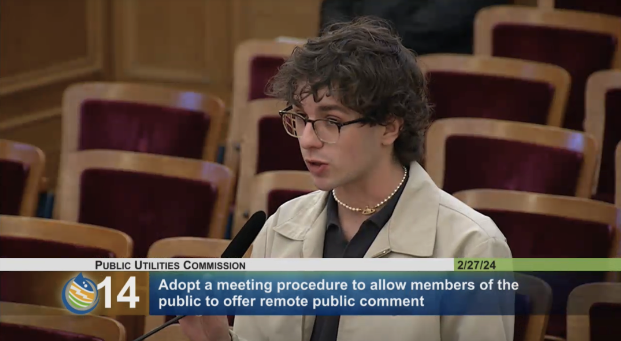Remote Participation at Public Meetings - A Right or A Privilege? Taking an Environmental Justice View
Because of this article, BAWSCA's CEO, Nicole Sandkulla, reached out to Sierra Club California staff to share an update on the Board's progress to return remote participation. They shared that technical difficulties have delayed their efforts but that live streams of their Board meetings and Board Policy Committee meetings can be expected beginning in April. They do not have a plan to implement remote public comment at this time.
On the 27th of February, the San Francisco Public Utilities Commission (SFPUC) took an important step to increase its transparency and accessibility by returning remote public comment to their Commission meetings. The SFPUC removed remote public comment in October of 2023 after San Francisco Mayor London Breed requested all Commissions follow the precedent set by the San Francisco Board of Supervisors, which eliminated the service in response to a hate speech incident.
The return of remote public comment was brought to a vote at the request of Commissioner Ajami, who argued that the SFPUC should be more accessible to its 2.7 million customers who live across the Bay Area. The item passed 3-2, with Commissioners Ajami, Maxwell, and Stacy voting in support, and Commissioners Paulson and Rivera voting against. The three yes votes were from Commissioners with more experience in the environmental sector and keen understandings of environmental justice. Commissioner Sophie Maxwell explained her 'yes' vote, saying "This is real democracy... when a person can call from anywhere and have direct contact with a policymaker, that’s what this country is about.”
This major win for transparency and inclusivity will allow Sierra Club California and its allies to better mobilize to oppose the SFPUC’s harmful actions against the Bay-Delta.
Remote public comment is a keystone of any transparent, accessible democracy because the service allows community members who are disabled, older, caregivers, students, hourly paid and working-class to make their voices heard in local government. Without remote public comment, members of the public are required to take time out of their day to attend public meetings that often occur during working hours, preventing the voices of vulnerable community members from being heard.
The San Francisco Mayor’s decision to remove remote public comment does not align with the attitudes of the majority of California cities. A recent survey by CommonCause found that 69 percent of cities utilized remote public comment in the post-pandemic era. The survey also found that 56 percent of cities that utilized remote public comment saw a general increase in public participation. Remote public comment was normalized during the pandemic and it remains in place across California because it increases public engagement. Those in power who advocate against remote public comment, such as Mayor London Breed, are removing a commonplace service that expands engagement in local politics. This reduces the transparency of local government and allows local politicians to avoid public scrutiny.
Some California water agencies have branded remote public comment as a no-longer-needed, pandemic-era service in attempts to shield their work from the public eye. The Bay Area Water Supply and Conservation Agency (BAWSCA) removed its remote engagement options in recent years and has ignored public calls to bring it back. BAWSCA replaced the ability for members of the public to remotely participate in its Board meetings via Zoom in September 2022 with a remote option only for the disabled to schedule a remote participation option via written request at least two days prior to the meeting. While the rights of the disabled population to access public meetings was upheld, the general public lost its ability to virtually access the meetings, placing barriers to the elderly, caregivers, working-class people, and any other Bay Area resident unable to take personal time out of their day to attend Board meetings in person.
In response to calls from community members, BAWSCA has made vague promises to return a live stream of their meetings to the public. The Board had one semi-successful livestream during their December Policy Committee meeting but has failed to return the option since.
Both the SFPUC and BAWSCA are pursuing anti-environmental lawsuits against the implementation of updates to the Bay-Delta plan and are supporting environmentally disastrous Voluntary Agreements (VAs). Remote public comment will ensure that community members who would bear the brunt of these harmful actions will have the ability to access public meetings and advocate for environmental and social justice. BAWSCA must take note from their neighbors at the SFPUC and reimplement remote participation.
Constituents hold sway over their local government and can use that power to demand remote participation services.
What can you do?
Take Action by sending a message to board members telling them to restore remote participation at their board meetings.
Jakob is an Organizer with Sierra Club California working to engage volunteers and build coalitions for water issues in the Bay Area. Previously, Jakob advocated for utility-scale offshore wind development in California and has spent years building communities within the youth climate movement. If you’d like to get involved with this campaign email Jakob at jakob.evans@sierraclub.org



Comments
John william Stump (not verified)
March 8, 2024 - 1:10pm
Permalink
Great Make this a State Law
Add new comment